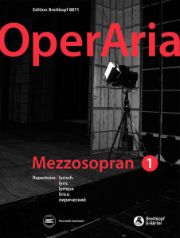Arias served anew
The OperAria series now also includes a repertoire volume for lyric mezzo-sopranos, with the much-appreciated additional material.

The publisher Breitkopf und Härtel sees its new edition of opera arias, which is organized by voice part, as a vocal coach. The series includes OperaAria four soprano volumes, three bass volumes, three baritone volumes and one alto volume have already been published. The present edition is aimed at lyric mezzo-sopranos - divided into light lyric and heavy lyric - and offers assistance in selecting suitable repertoire. The volume for dramatic mezzi is in preparation.
As already discussed here using the example of the soprano volumes (SMZ 11/2017, S. 25), this collection also presents a modern, systematic selection of arias that meet the requirements of today's theater practice. One of the most difficult tasks of any singing teacher is to choose the right repertoire at the right time, and here the publisher offers a hand for a healthy and sensible vocal development and provides guidance in the choice of audition and examination arias.
As in the bass and soprano aria albums, the repertoire has been selected and sorted by singers and experienced teachers. A phonetic assistant with texts spoken by native speakers plus their German and English translations is available for the singer to download. In addition, at the end of the booklet there are individual commentaries on the arias with information on the composer, the content of the opera and the context in which the aria is set, as well as methodical and technical notes on each piece.
Personally, I love it when, as here, the table of contents can be found at the very beginning of the booklet in a user-friendly way and only then do any forewords, comments, translations or methodological notes follow.
Baroque repertoire is completely excluded, the selection ranges from Mozart's Cherubino to Strauss' composer. In addition to such well-known pieces, there are also rarities and real trouvailles: Envious sideways glances at her soprano colleagues become superfluous when she sings Nelly's aria from Bellini's Adelson e Salvini tasting - you don't know whole exactly where Bellini copied from himself, he certainly did it very, very well. This version is perhaps a little smaller in scale than the soprano aria, of which one suddenly feels reminded. Meyerbeer's Urbain aria also adds a refreshingly unheard coloratura aria to the ever-same Rossini heroines, and the fact that the lower mezzo range is covered with Rossini's Tancredi alongside Rosina and Cenerentola is also very pleasing. To name just three examples.
OperAria, The repertoire for all voice genres, mezzo-soprano volume 1: lyric, edited by Peter Anton Ling, with the collaboration of Marina Sandel, EB 8871, € 32.90, Breitkopf & Härtel, Wiesbaden








